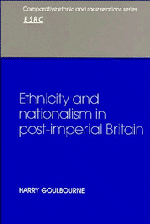Book contents
- Frontmatter
- Contents
- List of figures
- Acknowledgements
- 1 Introduction
- 2 The general problem
- 3 The communal option
- 4 Traditional and ethnic nationalism
- 5 From imperial British to national British
- 6 Diasporic politics: Sikhs and the demand for Khalistan
- 7 Diasporic politics: the demand for democracy in Guyana
- 8 Nationalism and the new pluralism in Britain
- 9 Conclusion: the need for a new national consciousness
- Notes
- Bibliography
- Index
5 - From imperial British to national British
Published online by Cambridge University Press: 05 January 2012
- Frontmatter
- Contents
- List of figures
- Acknowledgements
- 1 Introduction
- 2 The general problem
- 3 The communal option
- 4 Traditional and ethnic nationalism
- 5 From imperial British to national British
- 6 Diasporic politics: Sikhs and the demand for Khalistan
- 7 Diasporic politics: the demand for democracy in Guyana
- 8 Nationalism and the new pluralism in Britain
- 9 Conclusion: the need for a new national consciousness
- Notes
- Bibliography
- Index
Summary
Introduction
The discussion in this chapter hinges on two propositions that are central to the notion of the communal option. These arise from the variety of ethnic nationalism which is emerging in post-imperial Britain. The first proposition is that the development of nationalist expressions in British nationality and immigration laws before the 1960s tended to be as a series of reactions to nationalism in the dominions and colonies. There was, therefore, an initial reluctance on the part of both the British Conservative and the British Labour parties to embrace nationalism and nowhere was this more clearly expressed than in legislation regarding nationality. By the same token, when change was perceived by these parties to be desirable, the specific forms of nationalism they emphasized have been most clearly expressed in the debates over nationality laws. In the case of the present Conservative ministry its greater emphasis on ethnic nationalism is also strongly expressed in the crucial sphere of education.
The second proposition is that, whilst the main tendency of the Conservatives has been towards ethnic nationalism and the Labour party's has been towards traditional nationalism, in the end both parties have articulated almost identical types of nationalism during this transition from empire to nation. This convergence of Labour's traditional nationalism with the Conservatives' ethnic nationalism is a clear indication of a remarkably unified British response to the challenge of the post-imperial age.
- Type
- Chapter
- Information
- Ethnicity and Nationalism in Post-Imperial Britain , pp. 87 - 125Publisher: Cambridge University PressPrint publication year: 1991



